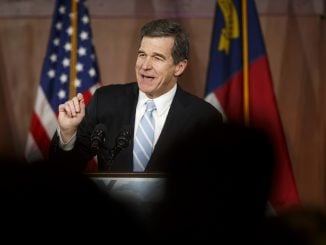RALEIGH — Democratic Gov. Roy Cooper’s executive order declaring a statewide COVID-19 emergency turns two on Thursday, March 10.
The order passes the two year mark as the U.S. Senate passed a joint resolution ending the national state of emergency order instituted by former President Donald Trump on March 13, 2020. That order has twice been extended by President Joe Biden, and Senate Democrats voted against the measure to end it with a vote down party lines of 48–47.
House Majority Leader John Bell (R- Wayne) and the entire House Republican Caucus sent a letter to Cooper demanding to know when he was lifting his order.
“After two years of executive orders that shut down businesses, restricted gatherings, closed schools, and mandated masks, the people of North Carolina are more than ready to move on,” the letter states. “As key metrics continue to fall and vaccines remain readily available to those who want one, there is no justification for a continued state of emergency.”
“Simply put, there is no emergency,” reads the letter. “We urge you to immediately end your emergency order and allow our state to move forward.”
In June 2021, Cooper was questioned multiple times about when he would end his statewide emergency order, which has no listed end date. He refused to say how or when he would end that order, citing it was needed to “continue to draw down federal funds” and that “we are still in the middle of this pandemic.”
Neither state nor federal elected officials who spoke to North State Journal could determine what federal funds the governor was referring to.
Order 116 states that, “The State of Emergency maintains state’s ability to receive federal funding to meet challenges presented by COVID-19;” however, this does not appear to be correct. An examination of the CARES Act and President Biden’s American Rescue Plan (ARP) did not have any requirement for a state to declare a statewide emergency to qualify for funds. Similarly, FEMA’s Lost Wages Supplemental Payment Assistance requires a declaration to be made by the president of the United States, not a state governor.
Cooper had also claimed there are “many other reasons” to maintain the state of emergency order, such as freeing up “resources, personnel and being able to wave regulations.”
After more questions about his statewide emergency order arose, Cooper issued a press release on June 11, 2021, which referred to the order around six times. By then, Bell and state Rep. Keith Kidwell (R-Beaufort) had already sent the governor a letter questioning the continued order, but the press release did not provide any answers.
“We cannot find any truth to his statement that we must be in a state of emergency to draw down federal funds or the other reasons listed in his latest executive order,” Bell said in a statement to North State Journal. Bell also noted that other states wouldn’t be ending their emergency declarations if doing so would cut off much-needed funding.
Near the end of October 2021, the N.C. House passed the Emergency Powers Act intended to put checks and balances on statewide emergency orders as Cooper’s state of emergency passed its 600 day mark. Within days, Cooper vetoed the bill on Nov. 2, 2021.
Just 16 days later on Nov. 18, Cooper signed the state budget into law which contained elements of the Emergency Powers Act. The emergency powers line item was pulled from Senate Bill 105. The bill stipulated an emergency declaration beyond 30 days would need concurrence from the Council of State. If concurrence is received, at the 60-day mark the state of emergency would expire unless the General Assembly acted to extend it. The effective date for the measures is Jan 1, 2023.
As of March 4, 2022, 23 states still have some form of a state of emergency health order in place and 15 of those 23 states have Democratic governors. In the Southeast, only North Carolina and Georgia have such an order.


